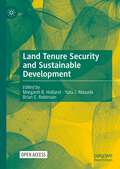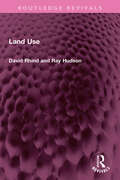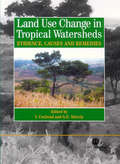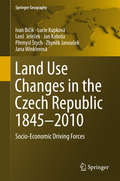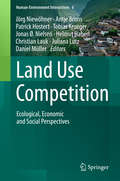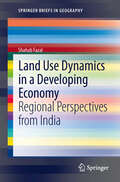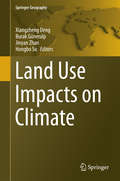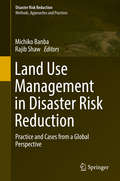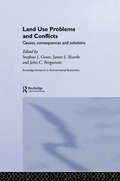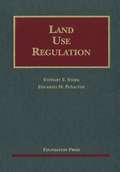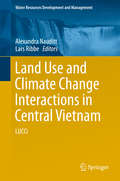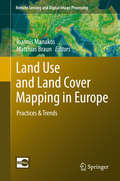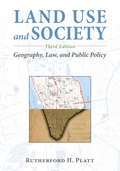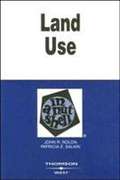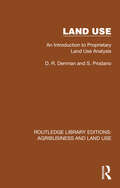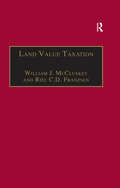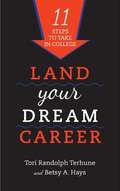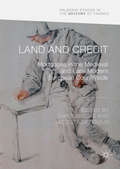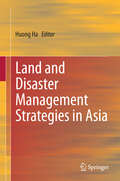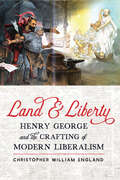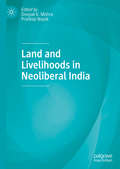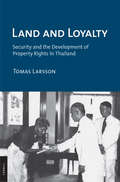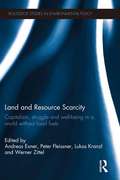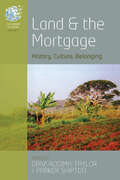- Table View
- List View
Land Tenure Security and Sustainable Development
by Margaret B. Holland Yuta J. Masuda Brian E. RobinsonThis open access book presents a nuanced and accessible synthesis of the relationship between land tenure security and sustainable development. Contributing authors have collectively worked for decades on land tenure as connected with conservation and development across all major regions of the globe. The first section of this volume is intended as a standalone primer on land tenure security and its connections with sustainable development. The book then explores key thematic challenges that interact directly with land tenure security, followed by a section on strategies for addressing tenure insecurity. The book concludes with a section on new frontiers in research, policy, and action. An invaluable reference for researchers in the field and for practitioners looking for a comprehensive overview of this important topic.This is an open access book.
Land Use (Routledge Revivals)
by Ray Hudson David RhindOriginally published in 1980, this book draws together a wide range of studies dealing with various aspects of land use in a text specifically designed to guide students through the complexities of the subject. It examines the history of the subject, its techniques, applications, the models that it applies and the frameworks within which it has been carried out. Land use remains a central political and practical issue in contemporary society.
Land Use Changes in Tropical Watersheds: Evidence, Causes and Remedies
by G. E. Shively I. CoxheadThis book studies land use change in tropical landscapes, with particular emphasis on the economic processes that influence rates of land degradation and forest clearing. Multidisciplinary contributions draw lessons from a rich, decade-long collection of economic, social and environmental data on the Manupali upland watershed in the southern Philippines. Through this detailed case study the book documents forces leading to land use changes, in particular the potential impacts of institutional evolution and policy reforms, and highlights interrelationships between biological, economic, and social phenomena.
Land Use Changes in the Czech Republic 1845-2010
by Ivan Bičík Lucie Kupková Leoš Jeleček Jan Kabrda Přemysl Štych Zbyněk Janoušek Jana WinklerováThe objective of this book is to analyze changes in the landscape of Czechoslovakia / the Czech Republic since the first half of the 19th century. The text focuses not only on describing these considerable changes by means of statistical and spatial data, but also on explaining the processes, societal, economic, political and institutional forces that drive them. Drawing on more than two decades of experience with land use research, the authors have combined methods and approaches from the fields of human geography, cartography, landscape ecology, historical geography and environmental history. The authors understand land use research as a way of analyzing nature-society interactions, their development, spatial aspects, causes and impacts. Czechoslovakia / the Czech Republic serves as an example, combining general processes occurring in landscapes of developed countries with the results of regionally specific driving forces, most of them political (world wars, communism, return to market economy etc. ).
Land Use Competition
by Jörg Niewöhner Antje Bruns Patrick Hostert Tobias Krueger Jonas Ø. Nielsen Helmut Haberl Christian Lauk Juliana Lutz Daniel MüllerThis book contributes to broadening the interdisciplinary knowledge basis for the description, analysis and assessment of land use practices. It presents conceptual advances grounded in empirical case studies on four main themes: distal drivers, competing demands on different scales, changing food regimes and land-water competition. Competition over land ownership and use is one of the key contexts in which the effects of global change on social-ecological systems unfold. As such, understanding these rapidly changing dynamics is one of the most pressing challenges of global change research in the 21st century. This book contributes to a deeper understanding of the manifold interactions between land systems, the economics of resource production, distribution and use, as well as the logics of local livelihoods and cultural contexts. It addresses a broad readership in the geosciences, land and environmental sciences, offering them an essential reference guide to land use competition.
Land Use Dynamics in a Developing Economy
by Shahab FazalToday, India still remains a rural agricultural country although the share of urban population has also increased but these figures do not tell the whole story. There are evidences that urban growth is dispersed and urban sprawl promotes the spread of urban land use into the rural-urban fringe. Here the attempt is to investigate the land transformation and the driving forces which were influencing the land transformation. The present study was done on peri urban interface of Aligarh city, a relatively small city, but as other north Indian cities, it is also expanding rapidly. Moreover, it too is surrounded by a populous rural area with productive and rich agricultural hinterland. Such conditions give rise to many conflicts and mutually beneficial complementarities in the rural and urban spheres. The result shows that the demand for land is high which results in informal urban development fulfilling the requirements of many of the city's residents. Every piece of land is a tradable commodity, and the pursuit of short-term profits is the predominant ethic. The actors in PUI are strong because it is characterized by intermixing of rural and urban activities and interests as well as the number of actors are greater than in any other area. .
Land Use Impacts on Climate
by Xiangzheng Deng Jinyan Zhan Burak Güneralp Hongbo SuThis book introduces a key issue in research on the climatic impact of land cover and land use changes via terrestrial biogeophysical processes. The parameterization of surface processes and a systematic approach to modeling the climatic impacts of land use change are discussed respectively, and can be used to improve parameterization schemes for climate numerical models and to provide a systematic method, thus offering more scientific and enhanced support for research on the climatic effects of land use/cover change. Further, based on predictions and scenario analyses of land use changes in typical zones, the climatic impact of various types of changes in different areas can be simulated through climatic numerical modeling, the simulation results are suitable for use in climate mitigation, land use planning, urban development planning, etc. Thus, the book is intended for researchers and professionals working in the area of meteorology systems, climatic numerical modeling, climate change, and land use/cover change, as well as decision makers in meteorology and land use planning. Professor Xiangzheng Deng is a senior research fellow at the Institute of Geographical Sciences and Natural Resources Research, Chinese Academy of Sciences.
Land Use Management in Disaster Risk Reduction
by Rajib Shaw Michiko BanbaThis book provides a wide range of studies on methods of assessing natural disaster risks and reducing those risks in the context of land use. A major benefit of the book is that it presents extensive research and practices from interdisciplinary perspectives through case studies of land use management against various natural disasters. The natural hazards include earthquakes, tsunami, floods, and other disasters, with case studies ranging from urban areas to areas with natural environments such as mountains, coasts, and river systems. By quantitative and qualitative analysis, this work illustrates how interactions between natural and human environments create natural disasters, and how disaster risks can be managed or reduced through methods related to land use. This book also covers a variety of challenges in land use management with sample cases from Asia as well as the United States and Europe. The main purpose is to provide greater insight into studies of natural disaster risks from the perspective of land use and the possibility of non-engineering methods to reduce those risks. This goal can be achieved through management of land use against various natural hazards in diverse environments.
Land Use Problems and Conflicts: Causes, Consequences and Solutions (Routledge Explorations in Environmental Economics #Vol. 2)
by John C. Bergstrom Stephen J Goetz James S. ShortleThe causes, consequences and control of land use change have become topics of enormous importance in contemporary society. Not only is urban land use and sprawl a hot-button issue, but issues of rural land use have also been in the headlines. Policy makers and citizens are starting to realize that many environmental and economic issues have the question of land use at their very core. Comprising papers from a conference sponsored by the Northeast Regional Center for Rural Development, Land Use Problems and Conflicts draws together some of the most up-to-date research in this area. Sections are devoted to problems in the United States and Europe, the consequences of such problems, land use-related data and alternative solutions to conflict. With a lineup including some of the best scholarship on this subject to date, this volume will be of use to those studying environmental and land use issues in addition to policy makers and economists.
Land Use Regulation
by Eduardo M. Penalver Stewart E. SterkThis casebook offers a concise, user-friendly presentation of land use law. Written with an eye toward simulating the sorts of land-use issues that students will face as lawyers working for developers, planners or environmental advocates, it incorporates a focus on practice throughout. In addition, the casebook devotes an entire chapter to complex and realistic scenarios that provide students an opportunity to bring to bear what they have learned throughout the semester to solve challenging legal and strategic problems.
Land Use and Climate Change Interactions in Central Vietnam
by Alexandra Nauditt Lars RibbeThis book summarizes the key findings of a five-year interdisciplinary research project funded by the German Federal Ministry of Research and Education (BMBF). It serves as a typical case study for a rapidly growing and developing urban center - Da Nang City, which is surrounded by remote areas characterized by increasing migration and limited development. A number of German and Vietnamese universities and international institutions participated in the project, contributing their particular expertise to assess the data-scarce region under study, two provinces in central Vietnam with a combined area of ca. 12,000 km#65533;.
Land Use and Land Cover Mapping in Europe
by Ioannis Manakos Matthias BraunLand use and land cover (LULC) as well as its changes (LUCC) are an interplay between bio-geophysical characteristics of the landscape and climate as well as the complex human interaction including its different patterns of utilization superimposed on the natural vegetation. LULC is a core information layer for a variety of scientific and administrative tasks(e. g. hydrological modelling, climate models, land use planning). In particular in the context of climate change with its impacts on socio-economic, socio-ecologic systems as well as ecosystem services precise information on LULC and LUCC are mandatory baseline datasets required over large areas. Remote sensing can provide such information on different levels of detail and in a homogeneous and reliable way. Hence, LULC mapping can be regarded as a prototype for integrated approaches based on spaceborne and airborne remote sensing techniques combined with field observations. The book provides for the first time a comprehensive view of various LULC activities focusing on European initiatives, such as the LUCAS surveys, the CORINE land covers, the ESA/EU GMES program and its resulting Fast-Track- and Downstream Services, the EU JRC Global Land Cover, the ESA GlobCover project as well as the ESA initiative on Essential Climate Variables. All have and are producing highly appreciated land cover products. The book will cover the operational approaches, but also review current state-of-the-art scientific methodologies and recommendations for this field. It opens the view with best-practice examples that lead to a view that exceeds pure mapping, but to investigate into drivers and causes as well as future projections.
Land Use and Society: Geography, Law, and Public Policy
by Rutherford H. PlattThe intersection between geography and law is a critical yet often overlooked element of land-use decisions, with a widespread impact on how societies use the land, water, and biodiversity around them. Land Use and Society, Third Edition is a clear and compelling guide to the role of law in shaping patterns of land use and environmental management. Originally published in 1996 and revised in 2004, this third edition has been updated with data from the 2010 U. S. Census and revised with the input of academics and professors to address the changing issues in land use, policy, and law today. Land Use and Society, Third Edition retains the historical approach of the original text while providing a more concise and topical survey of the evolution of urban land use regulation, from Europe in the Middle Ages through the present day United States. Rutherford Platt examines the "nuts and bolts" of land use decision-making in the present day and analyzes key players, including private landowners, local and national governments, and the courts. This third edition is enhanced by a discussion of the current trends and issues in land use, from urban renewal and demographic shifts in cities to the growing influence of local governance in land use management. Land Use and Society, Third Edition is a vital resource for any student seeking to understand the intersection between law, politics, and the natural world. While Platt examines specific rules, doctrines, and practices from an American context, an understanding of the role of law in shaping land use decisions will prove vital for students, policymakers, and land use managers around the world.
Land Use and the Carbon Cycle
by Daniel G. Brown Derek T. Robinson Nancy H. F. French Bradley C. ReedAs governments and institutions work to ameliorate the effects of anthropogenic CO2 emissions on global climate, there is an increasing need to understand how land-use and land-cover change is coupled to the carbon cycle, and how land management can be used to mitigate their effects. This book brings an interdisciplinary team of fifty-eight international researchers to share their novel approaches, concepts, theories and knowledge on land use and the carbon cycle. It discusses contemporary theories and approaches combined with state-of-the-art technologies. The central theme is that land use and land management are tightly integrated with the carbon cycle and it is necessary to study these processes as a single natural-human system to improve carbon accounting and mitigate climate change. The book is an invaluable resource for advanced students, researchers, land-use planners and policy makers in natural resources, geography, forestry, agricultural science, ecology, atmospheric science and environmental economics.
Land Use in a Nutshell
by John R. Nolon Patricia E. SalkinLand Use in a Nutshell is not a stand-alone book but rather an invaluable companion to the casebooks, articles and ongoing discussions in the United States and throughout the world about this thing called land.
Land Use: An Introduction to Proprietary Land Use Analysis (Routledge Library Editions: Agribusiness and Land Use #2)
by D. R. Denman S. ProdanoOriginally published in 1972, this work shed new light on the study of land use. The key to the analysis was the proprietary land unit, within which all positive decisions touching land use are made. The analysis has a universal relevance, irrespective of social order, economic philosophy and judicial systems. The work will be of interest to lawyers, economists, agriculturalists, town and country planners and those in central and local government.
Land Value Taxation: An Applied Analysis
by William J. McCluskey Riël C.D. FranzsenThis study of the strategic, policy and operational characteristics of Land Value Taxation is a unique and original contribution to Elston knowledge. McCluskey and Franzsen provide a clear and detailed synthesis of existing Land Value Taxation systems and address the perceived advantages and disadvantages of such systems. The implications of this work, based on a two-tier analysis of selected countries, will be critical in terms of informing policy makers when contemplating reviews of existing Land Value Taxation systems or its possible introduction. The empirical research underpinning this work has attempted to concisely provide the role of land value systems within the selected case study countries. The work has clearly identified a number of challenges being faced by those countries and jurisdictions that currently utilise land value tax systems. Given these challenges this book is timely in that it provides detailed expositions of property tax systems that are undergoing significant change and reform.
Land Your Dream Career: 11 Steps to Take in College
by Tori Randolph Terhune Betsy A. HaysContrary to what students, and society, are conditioned to think, obtaining a college degree does not automatically result in a job, let alone a dream career. In the last year, alone, half of college graduates are either jobless or underemployed in positions that don t fully use their skills and knowledge. Authors Tori Randolph Terhune, a gainfully-employed young college graduate herself, and Betsy A. Hays, a college professor, show readers what they can do in college to successfully pave the way for future employment in Land Your Dream Career. The authors provide eleven easy-to-follow strategies for effectively using time on campus to start building a career. Terhune and Hays leads students through content designed to help students set themselves up for success, without focusing on grades or papers. The 11 steps include tips about how students can become experts in their fields, build their brand, get involved in and outside the classroom, allow for wiggle room, network, follow the 75/25 rule (75% thinking, 25% doing) and use new media, such as social networking and blogging, to launch their career. Any student looking for that connection from college to getting to their dream career needs to read Land Your Dream Career. Terhune and Hays make it known that landing a good job is not impossible "
Land and Credit: Mortgages In The Medieval And Early Modern European Countryside (Palgrave Studies in the History of Finance)
by Chris Briggs Jaco ZuijderduijnThis volume investigates the use of mortgages in the European countryside between the thirteenth and eighteenth centuries. A mortgage allowed a loan to be secured with land or other property, and the practice has been linked to the transformation of the agrarian economy that paved the way for modern economic growth. Historians have viewed the mortgage both positively and negatively: on the one hand, it provided borrowers with opportunities for investment in agriculture; but equally, it exposed them to the risk of losing their mortgaged property. The case studies presented in this volume reveal the variety of forms that the mortgage took, and show how an intricate balance was struck between the interests of the borrower looking for funds, and those of the lender looking for security. It is argued that the character of mortgage law, and the nature of rights in land in operation in any given the place and period, determined the degree to which mortgages were employed. Over time, developments in these factors allowed increasing numbers of peasants to use mortgages more freely, and with a decreasing risk of expropriation. This volume will be appealing to academics and researchers interested in financial history, rural credit and debt, and the economic history of agrarian communities.
Land and Disaster Management Strategies in Asia
by Huong HaThis book focuses on land and disaster governance in Asian countries. The Asian region has become increasingly vulnerable to natural disasters, including floods, cyclones, storms, earthquakes, drought, typhoons and tsunamis. Further, as a result of unsustainable changes being made in patterns of land use, catchment and coastal zones, increasing population density, migration patterns, and the spread of consumer culture across countries, the impact of natural disasters has increased manifold. The book addresses two major concerns in this field. Firstly, it discusses topics intended to raise awareness among all stakeholders of the critical aspects of disaster management in the context of Asia. Secondly, it calls upon policymakers, researchers, academics, practitioners, private enterprises and civil society organizations, as well as all those who have been, are and will be affected by natural disasters to search for innovative and novel approaches to reducing risk and managing disasters.
Land and Liberty: Henry George and the Crafting of Modern Liberalism (Hagley Library Studies in Business, Technology, and Politics)
by Christopher William EnglandA comprehensive history of Henry George and the single tax movement.In 1912, Sun Yat-sen announced the birth of the Chinese Republic and promised that it would be devoted to the economic welfare of all its people. In shaping his plans for wealth redistribution, he looked to an American now largely forgotten in the United States: Henry George. In Land and Liberty, Christopher William England excavates the lost history of one of America's most influential radicals and explains why so many activists were once inspired by his proposal to tax landed wealth. Drawing on the private papers of a network of devoted believers, Land and Liberty represents the first comprehensive account of this important movement to nationalize land and expropriate rent. Beginning with concerns about rising rents in the 1870s and ending with the establishment of New Deal policies that extended public control over land, natural resources, and housing, "Georgism" served as a catalyst for reforms intended to make the nation more democratic. Many of these concerns remain relevant today, including the exploitation of natural resources, rising urban rent, and wealth inequality. At a time when class divisions sparked fears that capitalism and democracy were incompatible, hopes of building a social welfare state using the rents of idle landlords revitalized the middle class's conviction that democracy and liberty could be reconciled. Against steep odds, George made land nationalization vital to the politics of a nation dominated by small farmers and helped push liberalism leftward through his calls for collective rights to land and natural resources.
Land and Livelihoods in Neoliberal India
by Deepak K. Mishra Pradeep NayakThe book discusses important developments emerging around the land questions in India in the context of India’s neoliberal economic development and its changing political economy. It covers many issues that have been impinging the political economy in land and livelihoods in India since the 1990s, examining the land question from diverse methodological standpoints. Most of the chapters rely on evidence generated through primary surveys in different parts of the country. The book, via its diversity of approaches and methodologies, brings out new and hitherto unexplored and/or less researched issues on the emerging land question in India. The range of issues addressed in the volume encompasses the contemporary developments in the political economy of land, land dispossession, SEZs, agrarian changes, urbanisation and the drive for the commodification of land across India. The authors also examine role of the state in promoting the capitalist transformation in India and continuities and changes emerging in the context of land liberalisation and market-friendly economic reforms.
Land and Loyalty: Security and the Development of Property Rights in Thailand (Cornell Studies in Political Economy)
by Tomas LarssonDomestic and international development strategies often focus on private ownership as a crucial anchor for long-term investment; the security of property rights provides a foundation for capitalist expansion. In recent years, Thailand's policies have been hailed as a prime example of how granting formal land rights to poor farmers in low-income countries can result in economic benefits. But the country provides a puzzle: Thailand faced major security threats from colonial powers in the nineteenth century and from communism in the twentieth century, yet only in the latter case did the government respond with pro-development tactics.In Land and Loyalty, Tomas Larsson argues that institutional underdevelopment may prove, under certain circumstances, a strategic advantage rather than a weakness and that external threats play an important role in shaping the development of property regimes. Security concerns, he find, often guide economic policy. The domestic legacies, legal and socioeconomic, resulting from state responses to the outside world shape and limit the strategies available to politicians. While Larsson's extensive archival research findings are drawn from Thai sources, he situates the experiences of Thailand in comparative perspective by contrasting them with the trajectory of property rights in Japan, Burma, and the Philippines.
Land and Resource Scarcity: Capitalism, Struggle and Well-being in a World without Fossil Fuels (Routledge Studies in Environmental Policy)
by Andreas Exner Lukas Kranzl Peter Fleissner Werner ZittelThis book brings together geological, biological, radical economic, technological, historical and social perspectives on peak oil and other scarce resources. The contributors to this volume argue that these scarcities will put an end to the capitalist system as we know it and alternatives must be created. The book combines natural science with emancipatory thinking, focusing on bottom up alternatives and social struggles to change the world by taking action. The volume introduces original contributions to the debates on peak oil, land grabbing and social alternatives, thus creating a synthesis to gain an overview of the multiple crises of our times. The book sets out to analyse how crises of energy, climate, metals, minerals and the soil relate to the global land grab which has accelerated greatly since 2008, as well as to examine the crisis of profit production and political legitimacy. Based on a theoretical understanding of the multiple crises and the effects of peak oil and other scarcities on capital accumulation, the contributors explore the social innovations that provide an alternative. Using the most up to date research on resource crises, this integrative and critical analysis brings together the issues with a radical perspective on possibilites for future change as well as a strong social economic and ethical dimesion. The book should be of interest to researchers and students of environmental policy, politics, sustainable development and natural resource management.
Land and the Mortgage: History, Culture, Belonging (The Human Economy #9)
by Daivi Rodima-Taylor and Parker ShiptonThe mortgaging of land is not just economic and legal but also social and cultural. Here, anthropologists, historians, and economists explore origins, variations, and meanings of the land mortgage, and the risks to homes and livelihoods. Combining findings from archives, printed records, and live ethnography, the book describes the changing and problematic assumptions surrounding mortgage. It shows how mortgages affect people on the ground, where local forms of mutuality mix with larger bureaucracies. The outcomes of mortgage in Africa, Europe, Asia, and America challenge economic development orthodoxies, calling for a human-centered exploration of this age-old institution.
